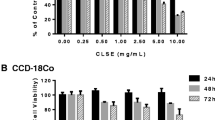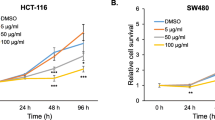Abstract
An epithelial cell adhesion molecule (EpCAM) was selectively expressed in human colorectal carcinoma. Treatment with plant-derived anti-EpCAM mAb (mAbP CO17-1A) and RAW264.7 cells inhibited cell growth in the human colorectal cancer cell line SW620. In SW620 treated with mAbP CO17-1A and RAW264.7 cells, expression of p53 and p21 increased, whereas the expression of G1 phase-related proteins, cyclin D1, CDK4, cyclin E, and CDK2, decreased, similar to mammalian-derived mAb (mAbM) CO17-1A. Similar to mAbM CO17-1A, treatment with mAbP CO17-1A and RAW264.7 cell decreased the expression of anti-apoptotic protein, Bcl-2, but the expression of pro-apoptotic proteins Bax, TNF-α, caspase-3, caspase-6, caspase-8 and caspase-9, increased. Cells treated with mAbP CO17-1A and RAW264.7 cells expressed metastasis-related gangliosides, GM1 and GD1a, similar to mAbM CO17-1A. These results suggest that mAbP CO17-1A is as effective on anti-cancer activity as mAbM CO17-1A.




Similar content being viewed by others
References
Alfonso LF, Srivenugopal KS, Arumugam TV, Abbruscato TJ, Weidanz JA, Bhat GJ (2009) Aspirin inhibits camptothecin-induced p21CIP1 levels and potentiates apoptosis in human breast cancer cells. Int J Oncol 34:597–608
Brodzik R, Glogowska M, Bandurska K, Okulicz M, Deka D, Ko K, van der Linden J, Leusen JH, Pogrebnyak N, Golovkin M, Steplewski Z, Koprowski H (2006) Plant-derived anti-Lewis Y mAb exhibits biological activities for efficient immunotherapy against human cancer cells. Proc Natl Acad Sci USA 103:8804–8809
Coffey RN, Watson RW, O’Neill AJ, Mc Eleny K, Fitzpatrick JM (2002) Androgen-mediated resistance to apoptosis. Prostate 53:300–309
Daniell H, Streatfield SJ, Wycoff K (2001) Medical molecular farming: production of antibodies, biopharmaceuticals and edible vaccines in plants. Trends Plant Sci 6:219–226
Feizi T (1985) Demonstration by monoclonal antibodies that carbohydrate structures of glycoproteins and glycolipids are onco-developmental antigens. Nature 314:53–57
Fukuda M (1996) Possible roles of tumor-associated carbohydrate antigens. Cancer Res 56:2237–2244
Gomord V, Sourrouille C, Fitchette AC, Bardor M, Pagny S, Lerouge P, Faye L (2004) Production and glycosylation of plant-made pharmaceuticals: the antibodies as a challenge. Plant Biotechnol J 2:83–100
Hyuga S, Yamagata S, Takatsu Y, Hyuga M, Nakanishi H, Furukawa K, Yamagata T (1999) Suppression by ganglioside GD1a of migration capability, adhesion to vitronectin and metastatic potential of highly metastatic FBJ-LL cells. Int J Cancer 83:685–691
Kannagi R, Izawa M, Koike T, Miyazaki K, Kimura N (2004) Carbohydrate-mediated cell adhesion in cancer metastasis and angiogenesis. Cancer Sci 95:377–384
Ko K, Steplewski Z, Glogowska M, Koprowski H (2005) Inhibition of tumor growth by plant-derived mAb. Proc Natl Acad Sci USA 102:7026–7030
Koprowski H, Yusibov V (2001) The green revolution: plants as heterologous expression vectors. Vaccine 19:2735–2741
Koprowski H, Steplewski Z, Mitchell K, Herlyn M, Herlyn D, Fuhrer P (1979) Colorectal carcinoma antigens detected by hybridoma antibodies. Somat Cell Genet 5:957–971
Kwak DH, Ryu JS, Kim CH, Ko K, Ma JY, Hwang KA, Choo YK (2011a) Relationship between ganglioside expression and anti-cancer effects of the monoclonal antibody against epithelial cell adhesion molecule in colon cancer. Exp Mol Med 43:693–701
Kwak DH, Seo BB, Chang KT, Choo YK (2011b) Roles of gangliosides in mouse embryogenesis and embryonic stem cell differentiation. Exp Mol Med 43:379–388
Laine RA, Hakomori S (1973) Incorporation of exogenous glycosphingolipids in plasma membranes of cultured hamster cells and concurrent change of growth behavior. Biochem Biophys Res Commun 54:1039–1045
Lapenna S, Giordano A (2009) Cell cycle kinases as therapeutic targets for cancer. Nat Rev Drug Discov 8:547–566
Lee DH, Koo DB, Ko K, Kim SM, Jung JU, Ryu JS, Jin JW, Yang HJ, Do SI, Jung KY, Choo YK (2007) Effects of daunorubicin on ganglioside expression and neuronal differentiation of mouse embryonic stem cells. Biochem Biophys Res Commun 362:313–318
Ma JK, Drake PM, Christou P (2003) The production of recombinant pharmaceutical proteins in plants. Nat Rev Genet 4:794–805
Riethmuller G, Holz E, Schlimok G, Schmiegel W, Raab R, Hoffken K, Gruber R, Funke I, Pichlmaier H, Hirche H, Buggisch P, Witte J, Pichlmayr R (1998) Monoclonal antibody therapy for resected Dukes’ C colorectal cancer: seven-year outcome of a multicenter randomized trial. J Clin Oncol 16:1788–1794
Satyanarayana A, Kaldis P (2009) Mammalian cell-cycle regulation: several Cdks, numerous cyclins and diverse compensatory mechanisms. Oncogene 28:2925–2939
Schoemaker MH, Ros JE, Homan M, Trautwein C, Liston P, Poelstra K, van Goor H, Jansen PL, Moshage H (2002) Cytokine regulation of pro- and anti-apoptotic genes in rat hepatocytes: NF-κB-regulated inhibitor of apoptosis protein 2 (cIAP2) prevents apoptosis. J Hepatol 36:742–750
Seol JG, Park WH, Kim ES, Jung CW, Hyun JM, Lee YY, Kim BK (2001) Potential role of caspase-3 and -9 in arsenic trioxide-mediated apoptosis in PCI-1 head and neck cancer cells. Int J Oncol 18:249–255
Shah R, Sabanatham S, Bembridge J, Mearns AJ, Shorrock K (1996) Tumor embolism to LAD during pneumonectomy. A case report. J Cardiovasc Surg (Torino) 37:319–321
Smith G, Walmsley A, Polkinghorne I (1997) Plant-derived immunocontraceptive vaccines. Reprod Fertil Dev 9:85–89
Staib L, Birebent B, Somasundaram R, Purev E, Braumuller H, Leeser C, Kuttner N, Li W, Zhu D, Diao J, Wunner W, Speicher D, Beger HG, Song H, Herlyn D (2001) Immunogenicity of recombinant GA733-2E antigen (CO17-1A, EGP, KS1-4, KSA, Ep-CAM) in gastro-intestinal carcinoma patients. Int J Cancer 92:79–87
Svennerholm L (1980) Ganglioside designation. Adv Exp Med Biol 125:11
Verch T, Yusibov V, Koprowski H (1998) Expression and assembly of a full-length monoclonal antibody in plants using a plant virus vector. J Immunol Methods 220:69–75
Vogel CA, Galmiche MC, Westermann P, Sun LQ, Pelegrin A, Folli S, Bischof Delaloye A, Slosman DO, Mach JP, Buchegger F (1996) Carcinoembryonic antigen expression, antibody localisation and immunophotodetection of human colon cancer liver metastases in nude mice: a model for radioimmunotherapy. Int J Cancer 67:294–302
Wenqi D, Li W, Shanshan C, Bei C, Yafei Z, Feihu B, Jie L, Daiming F (2009) EpCAM is overexpressed in gastric cancer and its downregulation suppresses proliferation of gastric cancer. J Cancer Res Clin Oncol 135:1277–1285
Xiao D, Herman-Antosiewicz A, Antosiewicz J, Xiao H, Brisson M, Lazo JS, Singh SV (2005) Diallyl trisulfide-induced G2-M phase cell cycle arrest in human prostate cancer cells is caused by reactive oxygen species-dependent destruction and hyperphosphorylation of Cdc 25 C. Oncogene 24:6256–6268
Zha H, Aime-Sempe C, Sato T, Reed JC (1996) Proapoptotic protein Bax heterodimerizes with Bcl-2 and homodimerizes with Bax via a novel domain (BH3) distinct from BH1 and BH2. J Biol Chem 271:7440–7444
Acknowledgments
This research was supported by a Grant (Code# PJ009419) from the Korean Rural Development Administration.
Author information
Authors and Affiliations
Corresponding authors
Electronic supplementary material
Rights and permissions
About this article
Cite this article
Ryu, JS., Lee, JT., Lim, MU. et al. Plant-derived mAbs have effective anti-cancer activities by increasing ganglioside expression in colon cancers. Biotechnol Lett 35, 2031–2038 (2013). https://doi.org/10.1007/s10529-013-1318-z
Received:
Accepted:
Published:
Issue Date:
DOI: https://doi.org/10.1007/s10529-013-1318-z





